Every Episode of The Twilight Zone, Ranked from Worst to Best
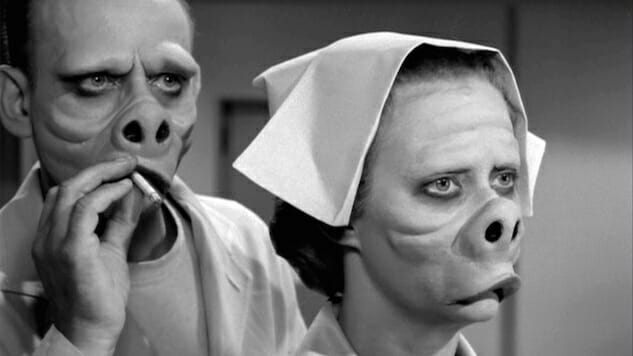
In the introduction to his invaluable book The Twilight Zone Companion, Marc Scott Zicree calls Rod Serling’s game-changer a “flower booming in a television desert.” It’s hard to overstate the series’ impact on our understanding of TV’s potential for telling bold, complex stories, not to mention the genres of science fiction, horror, and fantasy: In addition to defining the anthology series form, top Twilight Zone episodes embody Serling’s vision for weekly short stories with complex moral and existential quandaries. This made certain that “genre” fare could no longer be dismissed as mere child’s play.
Perhaps the only detriment to being a hardcore Twilight Zone fan is the knowledge that even the most “original” high-concept movie, TV series, or novel can often be traced back to at least one episode of the series, which premiered in 1959: After all, its central themes—fear, paranoia, prejudice, greed, ego, and so on—are timeless. For instance, its first copycat, The Outer Limits, was so successful its own right that it already enjoyed a seven-season reboot in the 1990s, and it would be impossible to imagine the popular Black Mirror series without The Twilight Zone’s influence.
Since the original came to an end in 1964, fans have debated the best The Twilight Zone episodes (with worst Twilight Zone episodes largely ignored in syndication or TV marathons). The enduring popularity of the concept has also allowed several continuations of its own. A Twilight Zone movie premiered in 1983, comprised mostly of remakes of classic episodes directed by the period’s Hollywood power players of the time. The film’s success led to a 1985 reboot of the series, which aired for three seasons, and a 2002 version hosted by Forest Whitaker, which lasted only one. Then came Jordan Peele, whose socially conscious horror masterwork Get Out suggested him as the perfect creative mind to carry Serling’s mantle: Fresh off the debut of his sophomore feature, Us, Peele’s 2019 spin on Serling’s series also aired one hit or miss season on CBS All Access (now Paramount+).
It seems nothing beats a classic, so below is a ranking of every original Twilight Zone episode from worst to best to aid in your own first-time viewing or rewatch:

156. “I Dream of Genie” (Episode 4.12)
The bottom of this list contains a number of titles from the ill-fated fourth season, when CBS decided to extend each episode to an hour. The Twilight Zone’s fables were fine for the half-hour format, but overstayed their welcome when doubled in length, with lots of repetitive filler. Add in the series’ ratio of strikes to hits when it comes to comedy, and “I Dream of Genie” sticks out like the pilot of a long and lazy sitcom. The premise, in which a wisecracking genie (Jack Albertson) puts a lovesick schlub (Howard Morris) into different scenarios so he can “conquer” his workplace crush, predates the Dudley Moore-Peter Cook classic Bedazzled. Watch that one instead.
155. “The Bard” (Episode 4.18)
The Twilight Zone is known for putting toxic characters in their place through ironic cosmic justice. This is one of the rare episodes in which such a person is not only presented as charming, but also gets rewarded for duplicitous behavior. Jack Weston mugs too frenziedly to the camera as a TV writer who conjures William Shakespeare (John Williams, as an elementary school-level imitation of “The Bard”) in order to steal his ideas. The episode is known for including a brief appearance by Burt Reynolds, but that’s not enough to give this one a chance.
154. “Mr. Dingle, the Strong” (Episode 2.19)
If The Twilight Zone has an acting MVP, it’s Burgess Meredith, but even Meredith’s natural warmth can’t save this gaudy slapstick episode about a one-dimensional buffoon given super strength by a duo of Martians (two bald men wrapped around a funeral shroud). Predictably, the man uses his new powers in a series of sequences reminiscent of George Reeves-era Superman, only to have the episode fizzle out when it runs out of ideas for lame set pieces.
153. “A Quality of Mercy” (Episode 3.15)
The story of a WWII American soldier (Dean Stockwell) magically finding himself fighting on the Japanese side could have gone down in Twilight Zone history as a fine but unmemorable example of its many shoe-on-the-other-foot fables. What makes it awful and cringeworthy today is the decision not to cast a Japanese actor for the switcheroo, but to put Stockwell in embarrassing yellow face, complete with a Mickey Rooney-in-Breakfast at Tiffany’s accent.
152. “Hocus Pocus and Frisby” (Episode 3.30)
The script for this Serling-penned episode, another in a long line of comedy missteps, reads like a horribly paced first draft knocked out in an hour. The simple premise, in which a compulsive liar (Andy Devine) is abducted by aliens who believe his lies, isn’t even introduced until more than halfway through the episode. Having written himself into a corner, Serling also utilizes an unforgivable deus ex machina to get himself out. Devine’s monotone performance almost puts one to sleep.
151. “Jess-Belle” (Episode 4.07)
This country melodrama suffers from both the shortcomings of Season Four’s stretched episode lengths and the horribly stereotypical depiction of women. The story of a lovesick girl (Anne Francis) who resorts to witchcraft in order to bag her aw-shucks good ol’ boy crush (James Best) is actually resolved halfway though. But since the episode has to be an hour long, we basically sit through a repetition of a tale that wasn’t very attractive to begin with.
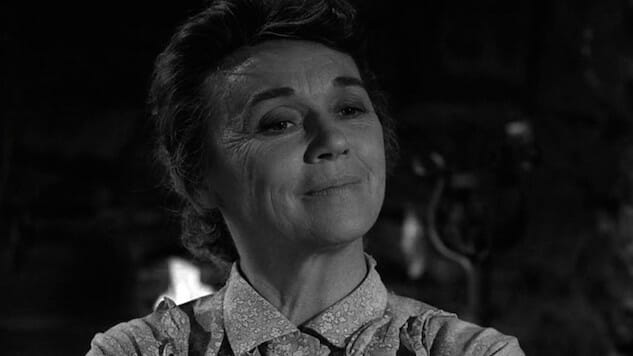
150. “Black Leather Jackets” (Episode 5.18)
Serling’s desperation to come up with new ideas at the tail end of the fifth and final season resulted in this ridiculous premise: A gang of “threatening,” West Side Story-esque motorcycle thugs are actually aliens who want to poison the town’s water supply. One (Lee Kinsolving) falls in love with a girl (Shelley Fabares) and tries to warn her. The ending is surprisingly bleak for such an unintentionally funny outing, but that’s about the only bright spot.
149. “Queen of the Nile” (Episode 5.23)
Like “The Sixteen Millimeter Shrine,” this episode sends up Sunset Blvd. with its exploration of the insecurities that plague aging movie stars. The story of a reporter (Lee Philips) becoming suspicious of a Hollywood star (Ann Blyth) who’s apparently not aged in decades starts interestingly enough, but it eventually turns into pure schlock. The out-of-left-field twist belongs in one of the especially pulpy “monster of the week” episodes from Star Trek: TOS, not The Twilight Zone.
148. “The Whole Truth” (Episode 2.14)
“The Whole Truth” is significant in the way it presaged the premise of the Jim Carrey hit Liar, Liar by more than three decades: It’s about a shady used car salesman (Jack Carson) who loses the ability to lie after inheriting a “haunted” car. The humor doesn’t go far beyond the simplistic and one-note “used car salesman has to tell the truth about the crappy vehicles he’s trying to unload” joke. To add insult to injury, the episode ends with a button that condones the prejudices stemming from the era’s Cold War paranoia.
147. “Mr. Bevis” (Episode 1.33)
This episode is another of the series’ ill-fated comedy outings. It posits a simple enough existential question via its morality-tale premise, which has the air of an after-school special: The story focuses on a loser (Orson Bean) who’s given a successful life by his guardian angel (Henry Jones), but is success worth it if comes at the expense of character? Bean is charming enough in the lead role, but the dull structure, repeating the same sequences with cartoonishly different results, wears out its welcome fairly early on.
146. “The Bewitching Pool” (Episode 5.36)
Strike one against this woefully miscalculated wish-fulfillment fantasy is that it’s basically children’s programming in what’s supposed to be an edgy sci-fi/horror series. It’s about two spoiled kids (Mary Badham and Tim Stafford) jumping into an interdimensional portal disguised as a swimming pool—yes, you read that right. On the other side is a creepily friendly old lady (Georgia Simmons) who gives the children everything they want, resulting in a rare episode where the worst possible lesson is learned at the end.
145. “What’s in the Box” (Episode 5.24)
The Twilight Zone is full of irony-laced tales where a protagonist is warned about some tragedy that will come in the future, only to come to that tragedy because they tried so hard to avoid it. This formula takes its silliest form in “What’s in the Box?,” whose title may or may not have inspired the infamous Brad Pitt line from Se7en. The story of a schlub (William Demarest) who can see the future on his TV starts off wittily enough, only to fall into unearned slapstick.
144. “The Incredible World of Horace Ford” (Episode 4.15)
The simple lesson from this episode on the dangers of nostalgia, about a man-child (Pat Hingle) who pines for his carefree days, only to realize they might not have been as fun as he thought when he’s transformed back into a child (Jim E. Titus), would need some filler even in half-hour form. At an hour, it feels interminably long, thanks largely to the repetition of the same mystery about a broken watch without much development.
143. “Sounds and Silences” (Episode 5.27)
This episode, about a man (John McGiver) who loves loud sounds—to the detriment of his loved ones—given a taste of his medicine, never gets its premise off the ground. Instead, it experiments with different forms of easy irony for the protagonist: First he hears everything, down to the quietest noise, then he can’t hear at all, etc., etc. That is, until we reach the simplistic and sexist finale.
142. “The Man in the Bottle” (Episode 2.2)
Whenever I see a parody of The Twilight Zone where the joke is that the show’s nothing more than a series of plot twists for plot twists’ sake, I’m reminded of this mismanaged and chaotic episode. This observation comes from the oft-mocked “You’re Hitler!” moment in “The Man in the Bottle,” but the whole affair’s a mess of jumbled twists. The story of a shop owner (Luther Adler) being given four wishes, only for each wish to contain an ironic twist, reads as if Serling decided to cram four episodes from the reject pile into a single script.
141. “A Most Unusual Camera” (Episode 2.10)
This modern take on the fable of the goose that laid the golden egg starts off intriguingly, about a group of crooks who steal a camera whose pictures tell the future. They use the camera to make money off of horse racing, but then argue about how to best utilize the rest of the film, even though they don’t know whether or not inserting new film will stop its powers. Unfortunately, Serling’s script shoots itself in the foot when it gets to the end and realizes that TV convention requires the criminals be punished. The rushed finale that results is full of unintentional hilarity.
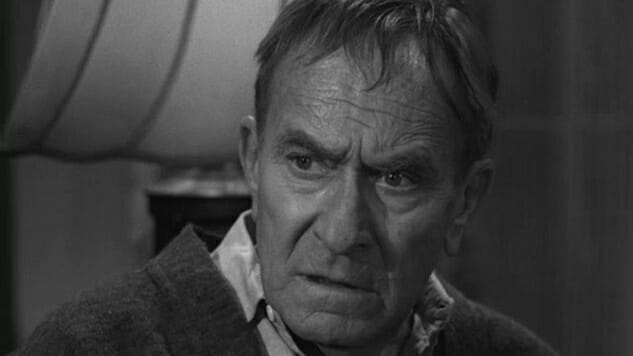
140. “Of Late I Think of Cliffordville” (Episode 4.14)
This is another Serling-penned episode about a bored and depressed man who’s transported to his youth, only to find out that the past wasn’t as hunky dory as he thought. Perhaps Serling, who was overworked during the run of the show, was trying to come up with any excuse not to dwell on his easier life of the past. “Cliffordville,” in which a rich old man (Albert Salmi) becomes young again and realizes that his old soul isn’t compatible with his youthful lifestyle, has two big knocks against it: At one hour, it’s far too long, and the episode’s application of magic—a woman named Devlin (Julie Newmar) who literally sports devil’s horns—is too cheesy even for Newmar’s reputation for camp.
139. “Caesar and Me” (Episode 5.28)
The Twilight Zone has its share of haunting episodes about sentient dolls wreaking bloody havoc, but “Caesar and Me” isn’t among them. Writer A.T. Strassfield takes the premise of Serling’s seminal evil-puppet episode, “The Dummy,” and adds an ill-advised 1930s gangster parody element. Jackie Cooper holds his own as a ventriloquist whose puppet turns into a bad Jimmy Cagney impersonator and forces him to commit crimes, but the episode as a whole runs out of steam quickly.
138. “Come Wander With Me” (Episode 5.34)
“Come Wander With Me” writes itself into a corner and can’t find a clear direction in which to take the premise. The solution? Pump the episode full of random twists and hope it works. Gary Crosby is halfway charming as a rockabilly crooner who travels back in time to record a tune he heard, but the episode gets bogged down in a series incoherent mysteries.
137. “The Mighty Casey” (Episode 1.35)
This lighthearted comedy about a baseball-playing robot (Robert Sorrells) given a human heart would have played better as a Saturday morning special for the Disney crowd. For The Twilight Zone, it’s too schmaltzy by far. Not only that, the tone is all over the place, sliding between slapstick silliness and preachy lessons on what it means to be human. The production was fraught with issues, to boot.
136. “The Chaser” (Episode 1.31)
The Twilight Zone’s politics were surprisingly progressive for its time. Unfortunately, it also offers the occasional episode, like the horribly sexist “The Chaser,” that reminds us just how backwards that time was. This supposedly “charming” story about a loser (George Grizzard) who uses a magic potion to make his crush (Patricia Berry) fall in love with him, only to freak out when she becomes too “clingy,” takes all agency away from the female character and turns her into a mindless piece of meat.
135. “Still Valley” (Episode 3.11)
For the Sunday school crowd, “Still Valley” might have worked as a wholesome faith-based morality tale. For everyone else, the Civil War-set story of a Confederate scout (Gary Merrill) receiving spiritual powers to destroy the opposing army will come across as too preachy. We watch The Twilight Zone for its morally complex and hard-hitting narratives. “Still Valley” is so vanilla, it belongs in a show called The Light Zone.
134. “The 7th Is Made Up of Phantoms” (Episode 5.10)
Another accidental-time-travel episode, “The 7th Is Made Up of Phantoms” is about a three-man National Guard unit that finds itself in the middle of The Battle of Bighorn during what were supposed to be routine war games. Sadly, the premise doesn’t come with a thematic exploration of what it means to be a soldier in the heat of battle, and the ending is more of an expected eventuality than an effective plot twist.
133. “The Passerby” (Episode 3.04)
Anyone who thinks M. Night Shyamalan came up with the “dead guy doesn’t know he’s dead” concept hasn’t seen The Twilight Zone’s myriad episodes containing the same twist. “The Passerby,” about a Confederate widow (Joanne Linville) mourning the passing of her husband (Warren Kemerling) and suddenly being visited by soldiers from both sides, is certainly the worst of these. It sounds like a spoiler to reveal the “twist” here, but this Serling-penned episode shows its cards far too early anyway. The final message about how “brother shouldn’t fight brother” is delivered with the complexity of a first-grade essay.
132. “Probe 7—Over and Out” (Episode 5.09)
“Probe 7—Over and Out” is promising at first, like a lighter version of the terrific “Two,” about a man and a woman trapped in a mysterious post-apocalyptic landscape and figuring out how to communicate with each other. In this case, an astronaut (Richard Baseheart) ends up on a strange planet and finds a woman (Antoinette Bower) to fall in love with. The episode rolls along fine, but the final twist is so head-slappingly stupid that it’s hard to credit anything it does right.
131. “A Thing About Machines” (Episode 2.04)
“A Thing About Machines” could have been a moody exploration of man’s relationship with modern technology. Unfortunately, writer Serling strikes a one-note approach and rides his premise to the finish line without anything interesting to say. The protagonist (Richard Haydn), a gourmet food critic who hates machines, is attacked by the machines he hates. That’s about it for 25 minutes.
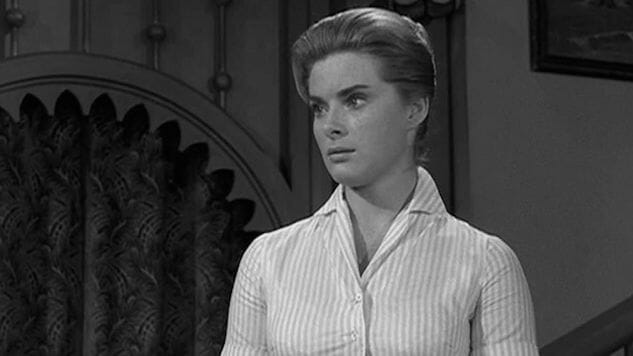
130. “Valley of the Shadow” (Episode 4.03)
The premise of “Valley of the Shadow” is intriguing: A reporter (Ed Nelson) finds himself in a mysterious sci-fi utopia, but he has to stay there for the rest of his life in order to enjoy it. The inner conflict about leaving behind one’s entire life for a better existence is certainly an existential question that suits The Twilight Zone. However, Season Four takes another victim with this overlong and padded script, and the ending erases the moral of the entire episode, rendering the experience moot.
129. “The Fugitive” (Episode 3.25)
Another child-friendly outing, “The Fugitive” is about a cuddly alien that disguises itself as an even cuddlier old man (J. Pat O’Malley) in order to live amongst humans on Earth. The friendship between the alien and a girl named Jenny (Susan Gordon) is sweet enough, but the episode has two big knocks against it: The decision made by the alien’s minions at the end makes no sense, and the alien costume is laughably phony even by 1960s standards.
128. “A Nice Place to Visit” (Episode 1.28)
The twist in this one-note episode is ripe for parody, since it exploits The Twilight Zone’s trademark “It’s the opposite of what you think!” revelations without a hint of self-awareness or irony. Not that it’s dour, mind you: The story of a crook (Larry Blyden) who gets shot by the police and finds himself in an afterlife where he gets everything he wants has a fairly light tone. Still, the twist can be predicted before the episode begins, and the final line—about the twist itself—is so annoyingly on-the-nose that it pulls the episode down near the bottom of this list.
127. “I Sing the Body Electric” (Episode 3.35)
Serling adapting Ray Bradbury should be a match made in heaven, but instead it’s dull, lifeless, and far from memorable. Bradbury’s character study is very simple: Will children learn to love their robot grandmother (Josephine Hutchinson) as much as the real one? Serling takes this and distills it down to showing off the cool stuff robo-grandma can do. In the end, we get a sleepily straightforward narrative that lacks sufficient character development. (This is one of the few entries that could have benefited from Season Four’s one-hour format.)
126. “A Short Drink from a Certain Fountain” (Episode 5.11)
This episode, about a millionaire (Patrick O’Neal) who takes an anti-aging serum and keeps aging backwards until he’s an infant, is a more faithful adaptation of F. Scott Fitzgerald’s short story The Curious Case of Benjamin Button than the movie version—even though “A Short Drink From A Certain Fountain” isn’t officially based on Fitzgerald’s work. The bad news, as anyone who’s read the suffocatingly whimsical short story can attest, is that the episode’s quirk overload sinks it.
125. “A Penny for Your Thoughts” (Episode 2.16)
As fans of the hit sitcom Bewitched well know, Dick York is an actor with oodles of natural charm. That’s why he’s oddly miscast in this episode about a morally bankrupt opportunist who gains mind-reading powers from a coin that stands on its side. (Yes, that’s the catalyst for the magic in this episode.) York’s character uses his power for shady purposes, which includes straight-up blackmail. Writer George Clayton Johnson struggles to find some sly appeal to the character, and eventually goes nowhere with it until the narrative just fizzles out.
124. “The Mind and the Matter” (Episode 2.27)
A narcissistic misanthrope (Shelley Berman) uses his newfound powers of meditation to make the other pesky people on Earth disappear and replaces them with clones of himself. Berman is comically cranky in the part, but “The Mind and the Matter” suffers from some bad special effects, like the phony masks given to extras to make it look like Berman’s character occupies the whole world. There’s a message in here about how “no man is an island,” but the episode is too preoccupied with clever camera tricks to show how many Berman clones it can fit into a single frame.
123. “Dead Man’s Shoes” (Episode 3.18)
There’s an insightful fable in here about the cyclical nature of “an eye for an eye,” but the script, by Charles Beaumont, doesn’t achieve much depth. The story of a man (Warren Stevens) possessed by a gangster who keeps trying to exact deadly revenge on those who killed him merely presents a tiny part of this cyclical tale, and that’s about all we get.
122. “The Changing of the Guard” (Episode 3.37)
Donald Pleasance’s pedigree as one of the most emotionally engaging character actors of his generation is the one bright spot in this maudlin tearjerker. The man can express a feature’s worth of emotions with a simple look. And that’s on full display here, as Pleasance plays a suicidal teacher who receives a pleasant surprise that makes him change his outlook on life. Unfortunately, a Hallmark card would find this episode’s script too saccharine.
121. “No Time Like The Past” (Episode 4.10)
This episode plays out as if Serling took two completely different 25-minute scripts and combined them into one as an awkward, last-minute attempt to come up with another Season Four outing. The story begins by diving bravely into the public’s nuclear paranoia: A man (Dana Andrews) who’s had enough of the constant fear decides to take matters into his own hands by traveling back in time and making sure the nuclear age doesn’t happen in the first place. But this fable about the futility of trying to alter fate suddenly turns into a Western halfway through, and it never recovers.
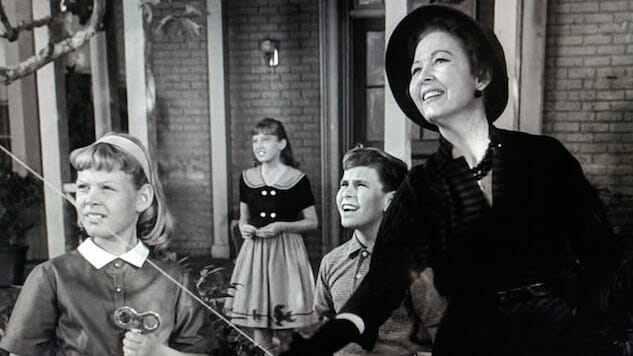
120. “The Self-improvement of Salvadore Ross” (Episode 5.16)
If a bad person can buy someone else’s positive traits, does that make him a good person, or is the sentiment artificial? That would be an interesting moral question for this episode, about a volatile and selfish man (Don Gordon) who can trade traits with people, to pose. But writer Jerry McNeely forgets to ask it. Instead, the script gets stuck in an irony loop, with the protagonist constantly disappointed by the deals he strikes with others until we reach the clever but all-too-sudden final twist.
119. “I Am the Night—Color Me Black” (Episode 5.26)
“Hate begets hate” is the simple message in this episode about a town full of people who conspire to give the death penalty to a murderer (Terry Becker) and are rewarded for their duplicity with a night that never ends. Serling’s script tries to put a literal spin to the idea of a life lived in darkness resulting in more darkness, but his preachy, on-the-nose dialogue and the melodramatic acting produce an overbearing experience.
118. “The Hunt” (Episode 3.19)
The ultimate twist in this wholesome episode should make dog lovers happy. But the schmaltzy tone is annoying, and the way writer Earl Hamner, Jr. stretches a concept worthy of a two-or three-page short story into 25 minutes, which leads to some languid pacing. “The Hunt” is yet another family friendly episode that goes against The Twilight Zone’s grain, about a lovable hillbilly (Arthur Hunnicut) and his loyal dog gradually realizing that people can’t see or hear them. What’s really going should be easy to predict.
117. “Hundred Yards Over The Rim” (Episode 2.23)
Cliff Robertson, a.k.a. Uncle Ben from Sam Raimi’s Spider-Man, delivers a heartfelt performance that’s the one bright spot in this maudlin time-travel episode. It’s about a man (Robertson) from the 19th century who finds himself in the present day (in this case, the early 1960s). The episode spends too much time on the man’s culture shock as he discovers all those kooky modern-day inventions before it gets to the ultimate point of the episode. The ending, about medicine that’s common to the 20th century but would have been revolutionary in the past, is clever, but it generates more questions that it answers.
116. “The Last Rites of Jeff Myrtlebank” (Episode 3.23)
This episode could have worked as one in which viewers make up their own minds about whether or not a supernatural event really took place. Unfortunately, the unnecessary final shot ruins the mystery. “Last Rites” is a whimsical tale about a man (James Best) who appears to come back from the dead, only to act differently enough for his loved ones to believe he’s been possessed by an evil spirit. There’s a fable here about how people can abuse their newfound powers of absolute influence through fear, but despite its attempts at some witty dark humor, the episode’s execution is too shallow to support it.
115. “A Piano in the House” (Episode 3.22)
Like the Season Two episode “The Whole Truth,” “A Piano in the House” is a precursor to Liar, Liar. This time, the device that forces people to tell the truth is a magical piano bought by an insufferable theatre critic. The aura of cynical humor is a boon, but the episode’s structure—in which the critic uses the piano to humiliate his enemies—runs out of steam. Those familiar with The Twilight Zone’s ironic finales, where the “hunter becomes the hunted,” shouldn’t have any trouble predicting the critic’s fate.
114. “The Fever” (Episode 1.17)
You have to hand this silly episode one thing: It pushed the boundaries of the “killer object” premise decades before it was run into the ground with concepts like “killer car,” “killer tire,” and “killer bed.” The killer in this one is, wait for it, a slot machine! Serling’s script focuses on a miserly man (Everett Sloane) who can’t get away from a slot machine after his first time ever gambling leaves him a winner. The episode tries to say something about the addictive nature of gambling, but the unintentional humor of the effort to make a bedazzled slot machine look sinister erases most of its morality-tale horror.
113. “The Jungle” (Episode 3.12)
This script, by Beaumont, has some genuinely tense moments—if you manage to ignore the hacky B-movie premise. It’s about an engineer (John Dehner) who comes back from a project in Africa and becomes more and more frightened as he suspects the wildlife from the jungle has followed him to the big city. Unfortunately, the schlocky ending ruins any intrigue the story builds as to whether the engineer is suffering from delusions or under a supernatural curse.
112. “Four O’Clock” (Episode 3.29)
“Four O’Clock” flows like lazy Twilight Zone fan fiction: It exploits every pattern the series had developed so far and executes it without much originality or flair. The episode follows a judgmental blowhard (Theodore Bikel) who believes that the people he hates—which means pretty much everyone except him—will finally reveal themselves to be the petty people (Hint: small people) they are when the clock hits four. Guess who’s revealed to be “petty” instead? There, I saved you 25 minutes.
111. “Printer’s Devil” (Episode 4.09)
The main downside of the fourth season strikes again with this overlong episode about the moral failings of the media, presaging the later motto “If it bleeds, it leads.” It centers on the editor (Robert Sterling) of a failing newspaper who makes a deal with a mysterious man named Mr. Smith (Burgess Meredith) to keep his business afloat. Mr. Smith’s linotype machine appears to print the news as it happens. Or perhaps it makes the news happen: Does Smith’s machine create disasters in order to get the scoop first? As he always does in The Twilight Zone, Meredith brings his fiendish charm to the part, but the convoluted plotting of such a straightforward premise uses up the viewer’s patience early on.
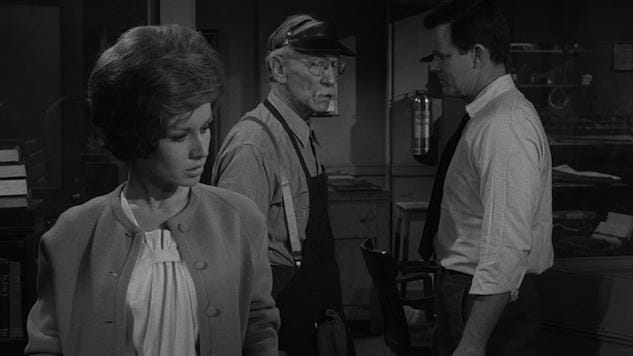
110. “On Thursday We Leave For Home” (Episode 4.16)
This somber examination of absolute power corrupting absolutely enjoys some solid directing and a morally complex and relatable lead performance by character actor James Whitmore. But we get the key to the tale 20 minutes in, and then have to sit through 35 minutes of repetitive filler to reach the anti-climactic finale. It’s about the leader (Whitmore) of a group of people trapped on a desolate planet not wanting to be saved because he wants to hold onto his power. Serling’s script is devoid of tension, since the leader’s subjects are understandably against staying on the planet in the first place. Without anywhere to go from there, the narrative keeps running on the same place.
109. “The Brain Center at Whipple’s” (Episode 5.33)
The fear of automation taking over human jobs, an issue that was at the forefront of Americans’ minds as factory tech became more and more sophisticated, is the central theme of this episode. Serling’s script follows a factory owner (Richard Deacon) who dismisses a chunk of his workforce and replaces them with machines. He’s smugly happy with the decision until, of course, his position is threatened by the machines. What’s odd about this episode is that, apart from the machines’ slightly futuristic appearance, there aren’t any real sci-fi, horror, or supernatural elements. This leads me to wonder why it was deemed worthy of The Twilight Zone in the first place.
108. “People Are Alike All Over” (Episode 1.25)
If there’s intelligent life out there in the universe, it might be best if those life forms aren’t exactly like humans. The episode’s twist is fairly predictable, especially if one bears in mind Serling’s affinity for clever wordplay. The title line is used to calm an astronaut (Roddy McDowell) who’s about to make first contact with an alien species and afraid of how different the aliens might be from him. To his dismay, the line turns out to be true. Based on a very short story from 1952, this would have worked as a 10-minute vignette; it’s a bit too languidly paced at 25.
107. “Cavender Is Coming” (Episode 3.36)
Almost six decades before gender-swapped remakes became a fad, Serling did it with “Cavender Is Coming,” a pretty faithful (but unofficial) remake of Season One’s “Mr. Bevis.” Just like that episode, this one is about a schlubby character (Carol Burnett) given riches by an angel (Jesse White) only to realize that her integrity and the support of her friends are what really matter. It suffers from the same issues as “Mr. Bevis,” but benefits from Burnett’s indelible magnetism. If you’re a fan of The Carol Burnett Show and want to see an earlier, similar turn by Burnett, check it out. But don’t expect much else.
106. “A Kind of a Stopwatch” (Episode 5.4)
As I’ve mentioned before, Serling was running out of fresh ideas by the time he got to the fifth season of The Twilight Zone, which resulted in repetition of episodes that worked before (with slight changes to the premise). In the case of “A Kind of Stopwatch,” Serling cannibalizes the ending of his iconic first season episode, “Time Enough at Last,” while stripping away the earlier version’s wit and whimsy. It’s about a man (Richard Erdman) who happens upon a stopwatch that stops time, and uses it to rob a bank. Anyone who’s seen “Time Enough at Last” can see where this is going, so just watch that one twice instead.
105. “You Drive” (Episode 5.14)
The idea of a crime-fighting car that manipulates its targets into confessing instead of running them over might make for a terrific Adult Swim series, but it’s too unintentionally silly (although not unenjoyable), for The Twilight Zone. “You Drive” is about a hit-and-run driver (Edward Andrews) haunted by his car until he’s convinced to face the music. The tone is far too self-serious for the premise, while the plot is too serious to play as comedy.
104. “Dust” (Episode 2.12)
The father (Vladimir Sokolov) of a man (John Alonso) who’s about to be hanged because he accidentally killed a little girl is sold magic dust that’s supposedly made from “concentrated love” by a snake oil salesman (Thomas Gomez). The father wants to use the dust on the townspeople in order to change their minds about the hanging in this episode-length Western. Or something like that: The fable’s moral turns out to be rather vague, and a number of sudden and uncharacteristic decisions as well as a deus ex machina at the end complicate matters further.
103. “The Trouble with Templeton” (Episode 2.09)
In “The Trouble with Templeton,” an aged actor (Brian Aherne) can’t focus on his work because he’s stuck in the past. He soon finds himself in his glory days again, only to realize they might not have been as glorious as he thought. This episode benefits from some quaint production design and heartfelt performances, including an appearance by a young Sydney Pollack. However, a brief reconsideration of the script’s final twist makes one realize how it undermines the story’s moral, kicking us back to square one.
102. “Young Man’s Fancy” (Episode 3.34)
“Young Man’s Fancy” is about a man (Alex Nicol) who doesn’t want to sell his house because he can’t let go of his childhood memories, so he receives ghostly messages from the house that support his argument. This character-based drama with slight supernatural elements starts off well enough, centered on the ways in which living in the past might be self-destructive. Unfortunately, it eventually shoots itself in the foot with an ending that’s both schmaltzy and goes completely against its lesson.
101. “The Mirror” (Episode 3.6)
After taking power by violent means, a Latin American dictator (Peter Falk) sees who will backstab him next thanks to a magic mirror that shows him the future. He disposes of the conspirators, but even this doesn’t bring him a sense of security. The Twilight Zone is full of episodes decrying the futility of power through corruption, and this episode delivers that message in a fairly plain way. On top of that, it’s painful to see the great Peter Falk hamming it up in an uncomfortably campy brownface performance.
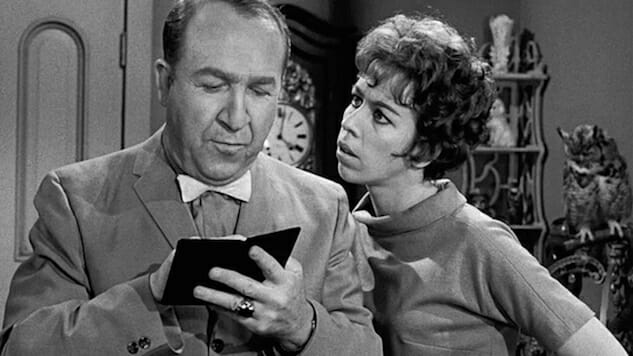
100. “The Parallel” (Episode 4.11)
I’m a sucker for Twilight Zone episodes about time paradoxes and parallel universes, and this episode has both. But the mystery around an astronaut (Steve Forrest) ending up on a parallel Earth that he doesn’t recognize is solved fairly early on. This leaves us with 50 minutes of episodic narrative as the astronaut visits familiar places, only to find out they’re slightly different. The acting lacks energy, and the ending is more of a self-fulfilling prophecy than a genuinely surprising twist.
99. “Uncle Simon” (Episode 5.08)
Two notable aspects of this otherwise dull and tonally awkward episode: One, it was directed by Don Siegel. Two, it stars Robby the Robot. The first gives this fairly run-of-the-mill, passive-aggressive revenge tale some visual complexity. It’s about a mean woman (Constance Ford) who kills her mean uncle (Cedric Hardwicke), only to be forced to take care of a robot who acts like him. The second eliminates much of the goodwill of the first, since the inclusion of the goofy Robby detracts from the supposedly sinister nature of the tale.
98. “Third from the Sun” (Episode 1.14)
This thriller about a scientist (Fritz Weaver) trying to flee his world on a space shuttle before everything is blown to smithereens by a nuclear holocaust plays the 1960s audience’s Cold War fears like a fiddle. Too bad that Serling, and to a larger extent Richard Matheson—who wrote the short story on which the episode is based—can’t help themselves, and insert a twist that undermines the still-universal immediacy of the themes. The twist is not only unnecessary, it’s also cheap and immediately predictable, especially if you take a second look at the title.
97. “Back There” (Episode 2.13)
This time-travel script teases a fascinating premise: What if Lincoln’s assassination could be stopped? It’s about a man (Russell Johnson) who discusses time travel with his buddies and is coincidentally sent back to the time right before that night at Ford’s Theatre. Will he be able to save the president in time and change the course of history? The episode contains some engaging suspense, but the ending strays away from the plot itself to deliver some mixed messages about the story’s meaning.
96. “Showdown with Rance McGrew” (Episode 3.20)
This is a tongue-in-cheek episode about how actors who portray heroes are far from what they seem on screen. It’s about a prima donna actor (Larry Blyden) suddenly finding himself in a real Wild West town while shooting a Western. Blyden is amusing as he immediately loses his ego and begs for his life when confronted with real badasses, and the story is notable for its self-aware humor. However, the baffling twist that comes out of nowhere at the very end leaves a sour taste.
95. “Ninety Years Without Slumbering” (Episode 5.12)
Richard deRoy’s script, based on an unpublished short story by Twilight Zone regular Johnson, explores our anxiety over death. It’s about an old man (Ed Wynn) who’s convinced that he’ll die the moment his clock is stopped, so he goes to great lengths to keep it working. The ending pulls off an impressive genre switcheroo, but the structure is too scattered until we get there. It doesn’t help that not much happens between the first minute and the final moments.
94. “Ring-A-Ding Girl” (Episode 5.13)
The Twilight Zone is full of inspirational stories about people sacrificing themselves for the greater good. This episode falters because the heroics it depicts don’t reflect much of a choice on the part of the protagonist. The tale of a movie star (Maggie McNamara) receiving premonitions that her hometown will burn down, forcing her to make some tough decisions, ends exactly as one would expect. It’s the extra twist after the climax that makes this one a bit morally iffy.
93. “Execution” (Episode 1.26)
A criminal named Caswell (Albert Salmi) who’s about to be hanged in 1880 finds himself in the series’ present thanks to a scientist (Russell Johnson) with a time machine that picks people up at random. This Serling-penned episode starts off promisingly, but then Serling seems unable to figure out where the story should go from that point on. So he throws a bunch of plot points that feel random, until we get to the anti-climactic time-loop finale.
92. “The Thirty-Fathom Grave” (Episode 4.2)
This episode is about a group of soldiers who stumble upon a submarine that was sunk during World War II, only to be rewarded with the sub’s ghost crewmembers haunting them. The tone is appropriately spooky, and the theme of soldiers carrying wartime guilt is handled with care. But the fourth season strikes again, and the overlong episode follows the same sequence of events—ghosts appear and disappear, with no one believing they exist until they see something they left behind—until it reaches its end.
91. “The Prime Mover” (Episode 2.21)
This fable about the destructive nature of greed and the importance of quitting while one’s ahead features a gambler (Dane Clark) who finds out that his pal (Buddy Ebsen) has telekinetic powers and decides to use them to win big in Vegas. He of course loses control and keeps wanting more. In addition to the episode being convoluted, the final moral switcheroo about the telekinetic man won’t surprise anyone.
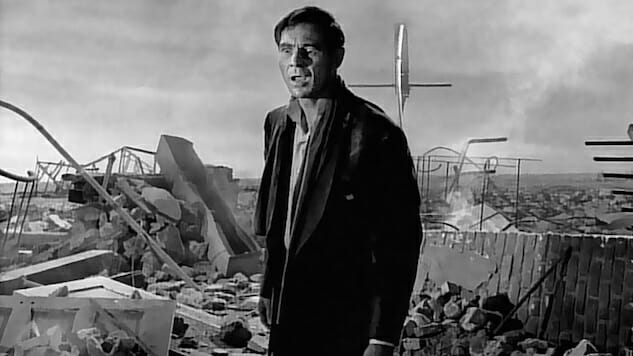
90. “The Arrival” (Episode 3.2)
The script begins intriguingly enough: A plane lands without any passengers or cargo. On top of that, the officials who investigate the plane each see different seats and serial numbers. If only the mystery remained unsolved, since it’s a hell of a lot more interesting than the underdeveloped reveal. This is one episode where the quality of the buildup works against the episode, since it makes the ending that much more disappointing.
89. “One More Pallbearer” (Episode 3.17)
Some Twilight Zone episodes begin with sci-fi or fantasy elements, only to reveal that those elements are in fact psychological. Then there are episodes like “One More Pallbearer,” which makes clear that it’s primarily a psychological story from the outset. It’s the tale of a man (Joseph Wiseman) who requests an apology from those who wronged him if they are to enter his doomsday bunker at the verge of nuclear annihilation. The decision his guests end up making is too much of a plot convenience, but the final shot is haunting enough to (almost) save the episode.
88. “The New Exhibit” (Episode 4.13)
The premise of this episode, about a man (Martin Balsam) who stores wax figures of history’s most famous serial killers, only for the figures to come to life and begin to kill again, could work as either a very short story, or be expanded into a horror feature. As a 50-minute episode, it takes a long time to get going, then ends abruptly just when it was beginning to get interesting. Balsam, a legendary character actor, delivers a creepy performance that’s too good for the uneven material.
87. “The Escape Clause” (Episode 1.06)
The idea of a hypochondriac (David Wayne) making a deal with the Devil (Thomas Gomez) is ripe for exploring the banality of a life without risks or consequences. But the episode can’t settle on a tone between morbid humor and tragic drama. In order to fit into the 25-minute format, Serling is forced to rush his protagonist’s character arc and have him tire of his endless life too quickly, creating an empathy gap for the audience.
86. “In His Image” (Episode 4.01)
This is another Season Four episode that feels like two half-hour scripts were awkwardly merged together. It begins as the kind of existential nightmare The Twilight Zone weaves so well, as a man (George Grizzard) with murderous instincts tries to uncover his past. It gradually turns into an on-the-nose examination of artificial intelligence versus the human soul. The build-up is entertaining, and writer Beaumont keeps the mystery alive. But a moment’s scrutiny after the episode’s over unravels many obvious plot holes.
85. “Mute” (Episode 4.05)
In both audiovisual and literary form, Matheson was a master at using sci-fi or fantasy ideas to serve character-oriented stories about human nature. “Mute” is no exception, but it could have benefited from a slightly shorter runtime and more even pacing. The story of a mute girl with telekinetic powers (Ann Jillian) trying to live amongst normal people deftly examines how prejudice against those who are different than us can be gradually defeated. Jillian is a formidable presence for a child actor, and the ending is heartwarming, but it takes a lot of filler to get there.
84. “Mr. Denton on Doomsday” (Episode 1.03)
This Western fable about a drunk gunslinger (Dan Duryea) becoming a crack shot through magic bestowed on him by a mysterious salesman (Malcolm Atterbury) who wanders into town communicates its rudimentary key without much fanfare: Don’t let any unearned power get to your head, since it can easily be taken away and given to someone else. The mysterious man’s name is Fate, which indicates the level of subtlety in this OK but ultimately forgettable episode.
83. “What You Need” (Episode 1.12)
Remember that thrilling sequence in Minority Report where the precog could predict exactly what Tom Cruise’s character needed seconds before he did in order to steer clear of the police? This episode is its precursor, featuring a salesman (Steve Cochran) who can predict what people will need before they’ll need it. He sells one of his customers (Ernest Truex) the pair of scissors he ends up using to save his life. But then the customer wants more predictions and threatens the salesman for them, forcing the salesman to come up with a solution. The premise is inventive, but the execution of the ending is a bit too simplistic.
82. “Elegy” (Episode 1.20)
This is another episode in which the mystery is so intriguing that the third act’s long, dry exposition—covering every aspect of what really took place—is a serious disappointment. It’s about a team of astronauts ending up on a planet where everyone is frozen in place. The explanation is neat, and the morbid twist is decent Twilight Zone fodder, but they still don’t match the haunting creepiness of the setup.
81. “A World of His Own” (Episode 1.36)
The final episode of the first season plays out like a tongue-in-cheek wrap party for the production’s harried schedule. It’s a loosely structured, meta-narrative comedy about a writer (Keenan Wynn) who can bring people and things to life simply through his writing. The script rolls out like a sketch show, with the writer bringing hot blondes and even an elephant into his office, baffling his wife (Phyllis Kirk). It’s fun and light, but nothing more.
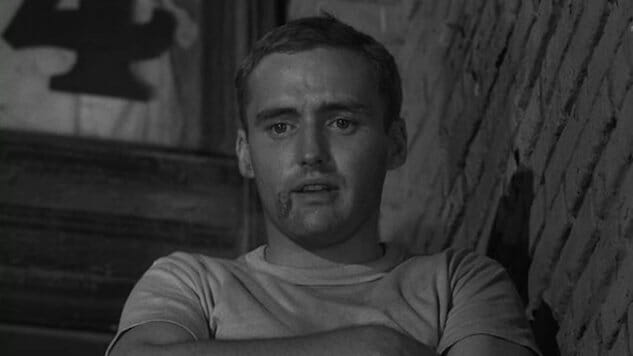
80. “He’s Alive” (Episode 4.04)
Unfortunately, this episode about a Neo-Nazi (Dennis Hopper) who gets his goose-stepping orders from a mysterious ghostly figure in order to expand his operation is still relevant today. This is one Season Four episode that works in the 50-minute format, since it’s more of a character study than high-concept plot. Hopper brings his trademark intensity to the role, which makes him equally captivating and a bit too hammy. The “surprise” identity of the ghostly figure that ends up controlling him? Do you even need a second guess?
79. “Praise of Pip” (Episode 5.01)
Jack Klugman was one of those invaluable character actors who could express great sadness and regret through a simple look. So he’s an apt pick for the episode’s protagonist, a lowlife bookie who finds out that his son (Billy Mumy) is critically injured in Vietnam and decides to go straight. The premise and the acting are prime Twilight Zone, but Serling pumps the schmaltz too high at the end and undermines the episode’s moral complexity. The script is notable for referring to the Vietnam conflict before the Tonkin Gulf Resolution turned the U.S. involvement into a full-scale war.
78. “The Jeopardy Room” (Episode 5.29)
This is a gripping thriller in the form of a well-structured chamber drama, led by an intense performance from the great Martin Landau. So what’s the problem? The most glaring one is that the script seems to have been transplanted from a spy drama. Sure, it’s exciting, but it’s more reminiscent of a Cold War political thriller than an episode of The Twilight Zone. It’s about Landau’s Communist bloc defector trying to find a bomb planted in his room. The finale is a major miss, since it asks the audience to accept that the sly antagonist (John van Dreelen) has suddenly turned into an idiot.
77. “Nick of Time” (Episode 2.07)
William Shatner cut his Twilight Zone teeth in this episode as an everyman who becomes subservient to an eerily correct fortune-telling machine. As the device keeps giving him the right decisions for his life, he realizes he can’t make choices of his own, worrying his wife (Patricia Breslin) in the process. Matheson, who wrote the episode, is usually aces when it comes to high-concept premises with clever endings, but he can’t seem to figure out how to end this one in a conceptually satisfying way. It eventually fizzles.
76. “The Little People” (Episode 3.28)
By this point, you should be familiar with The Twilight Zone’s irony-based fable formula: What a morally dubious character exploits most often ends up happening to them. Some of these scripts find a way to extend their clever ideas into character studies that fit the half-hour format; some might work better as two- or three-page short stories. This one belongs in the latter category. The story of a pair of astronauts (Joe Maross and Claude Akins) finding a tiny community of aliens who give them a Messiah complex is a fun critique of man’s thirst for power, but the twist is too simplistic and predictable for the episode to be very memorable.
75. “The Last Night of a Jockey” (Episode 5.05)
The legendary Mickey Rooney knocks it out of the park in this single-act one-man-show disguised as a Twilight Zone episode. He certainly elevates the simple material about a jockey (Rooney) at the end of his career who wishes to be big. Still, the ironic ending is far too easy to guess: Watch this one for the performance, not for the script.
74. “The Fear” (Episode 5.35)
Another Season Five episode which Serling appears to be running out of fresh ideas, “The Fear” follows a skittish woman (Hazel Court) and a state trooper (Mark Richman) terrorized by mysterious aliens—resembling an incredibly tense and well-known Season Two episode called “The Invaders.” Almost the antithesis of the earlier episode, which relied heavily on visual scares, “The Fear” is bogged down by too much exposition. That said, the tone-shifting ending if full of quaint humor.
73. “Passage on the Lady Anne” (Episode 4.17)
This melodramatic Season Four script works mainly because it focuses on character development rather than concept. It’s about a couple (Lee Philips and Joyce Van Patten) whose marriage is on the rocks boarding a cruise ship full of septuagenarians as a last-ditch attempt to rekindle their relationship. The fantastical truth behind the ship appears to be crammed in to add a Twilight Zone flavor to an otherwise straightforward romantic drama. But the attention to the protagonists’ arcs and passionate performances from Philips and Van Patten almost save the day.
72. “The Four of Us Are Dying” (Episode 1.13)
One could imagine this shape-shifting episode as a one-off comic issue in the X-Men universe. It’s about a man (Harry Townes) who can magically turn himself into any person he comes into contact with and using his powers in shady ways. Of course, this being The Twilight Zone, his evil deeds eventually catch up with him. The structure is a bit too fragmented, with the shape-shifter jumping from one unrelated shenanigan to another, but the pulpy tone keeps the viewer engaged.
71. “King Nine Will Not Return” (Episode 2.01)
This is one of those psychologically heavy episodes about the self-destructive power of guilt, and certainly a decent entry in a series that has a surprising number of them. The story of a captain (Bob Cummings) looking for his crew after his plane crashes takes an unexpected turn halfway through. Cummings is shaken but measured in the role, and the episode enjoys some solid pacing. This is one of those stories that could have worked better had it remained fully in the psychological realm, though, since a reveal at the very end makes the episode a bit unintentionally silly.
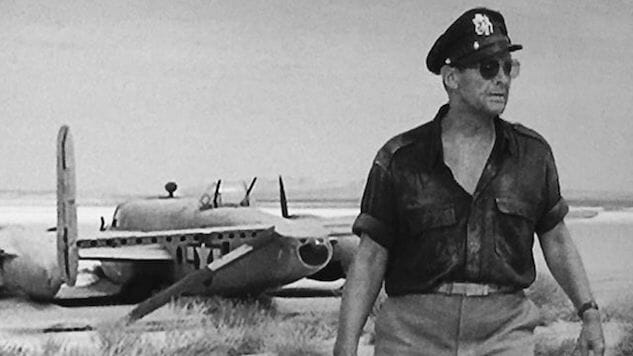
70. “And When The Sky Was Opened” (Episode 1.11)
Those suffering from anxiety over the fickleness of existence might want to skip this intense episode. It’s about a group of astronauts returning to Earth after a mission, only to find out that no one has any memory they existed in the first place. This is one of those solid but fairly single-minded Serling-written episodes that begin on a tone of inexplicable unease and then ratchet up the tension. Instead of going for an easy shock, Serling eventually settles for an internalized appreciation of the gift of life.
69. “I Shot an Arrow into the Air” (Episode 1.15)
The twist in this episode is so ingenious that Serling immediately bought the rights to the idea when Madelon Champion pitched it to him at a party. (Anyone familiar with Serling’s disdain for unsolicited ideas knows how rare an occasion this was: It never happened again.) The problem with “I Shot an Arrow into the Air,” about astronauts who find themselves stranded on a desolate asteroid, isn’t the twist—it’s that it’s only about the twist. Twenty minutes of filler with the astronauts discussing where they might have ended up gives the audience too much time to figure out the ending. With a killer theme at the center and some variations on the character development, this could have been one of the greats.
68. “A Stop at Willoughby” (Episode 1.30)
As you might have gathered by now, Rod Serling wrote a lot of episodes featuring adult men stressed about their jobs looking for a respite in nostalgia. But “A Stop at Willoughby” warns of the dangers of living in the past, starring James Daly as a man who hates his life so much that he wills a fantasy 19th-century town into existence. Of course, what’s really going on isn’t nearly as pleasant, and the climax offers the kind of darkness we expect from The Twilight Zone at its best, even if the wordplay in the finale is a bit too coy.
67. “The Rip Van Winkle Caper” (Episode 2.24)
This caper about a group of robbers stealing millions of dollars’ worth of gold and then putting themselves in suspended animation in order to get away with their crimes has a terrific twist ending that lays the dark humor on thick. Unfortunately, the pacing before that point is rather too languid, and Serling spends more than enough time on the robbers bickering—which turns out to be unimportant to the episode’s narrative. Yet almost all is forgiven once we reach the climax.
66. “From Agnes—With Love” (Episode 5.20)
Those familiar with the classic Futurama episode in which The Planet Express ship’s computer falls in love with Bender and stalks him should find a lot to like in this tongue-in-cheek A.I. romance. An engineer (Wally Cox) is brought in to provide maintenance for a computer named Agnes, who gradually falls for him. About 10 minutes into the episode, it’s easy to see where it’s all going, but the fun is in the light romp, not the destination.
65. “Nervous Man in a Four-Dollar Room” (Episode 2.03)
This more or less one-man, one-location episode asks whether the magic is in the protagonist’s mind or if there’s an actual fantasy element all along. The fun for the viewer is that, whichever side you end up on, you’re probably right. Joe Mantell gives an edgy performance as a man forced to commit a murder he knows he’ll be caught for. In order to psych himself up, he creates a more confident persona in the mirror. Is the mirror image real, or is it in his mind?
64. “Death Ship” (Episode 4.06)
What elevates this Season Four episode over its counterparts is that both halves of the diffuse script nonetheless supply satisfying mysteries. The first half is about a spaceship’s crew stumbling on a duplicate of their craft with all of their doppelgängers dead inside. This leads to the second half, an engaging time-loop paradox with a strong finish. Both carry different tones and narrative structures, so the episode as a whole still feels a bit forced to fit into Season Four’s mold. But it’s a thrilling ride nevertheless.
63. “Static” (Episode 2.20)
This sweet, tear-jerking episode from Beaumont, based on a short story by OCee Rich, pays respectful homage to how much radio shaped lives in the early 20th century. It’s about a cantankerous old man (Dean Jagger) who finds a sliver of happiness through a radio that broadcasts from the past. The episode finds a nice balance between pointing out the dangers of living in nostalgia and the occasional respite of doing so.
62. “Spur of the Moment” (Episode 5.21)
We all have moments of regret where we’re certain that choices we didn’t make would have been the right ones. This episode, which starts off as standard melodrama and ends in a bitterly toned time loop, posits that perhaps those choices aren’t what we thought they were. It’s about a young woman (Diana Hyland), forced to marry someone she doesn’t love, who’s followed by a sinister figure on horseback. It’s easy to guess the identity of the figure by the third act, but that’s also part of the episode’s thematic heft.
61. “Mr. Garrity and the Graves” (Episode 5.32)
This episode, about how a violent past results in a lifetime of guilt and paranoia, has such a deliciously ironic ending that I almost want to leave my description at that. Unfortunately, it also makes the mistake of tacking on an extra twist that almost undermines the script’s themes. “Mr. Garrity” follows a man (John Dehner) who promises to resurrect the town’s dead. But do the townspeople, who might have contributed to the deaths, really want that to happen? Just ignore the last 45 seconds or so, and the climax remains a tasty bit of karma.
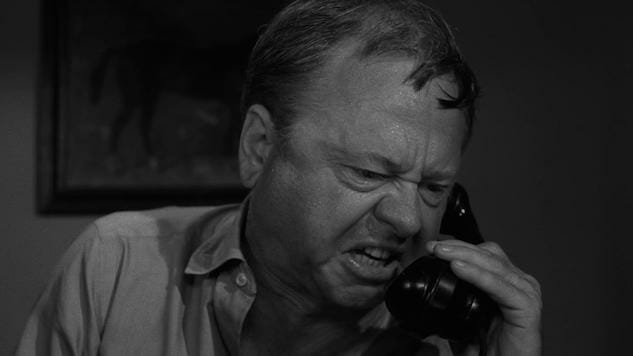
60. “The Last Flight” (Episode 1.18)
Momentary choices of cowardice or bravery can result in tremendous ripple effects through time, and World War I pilot Decker (Kenneth Haigh) is one of the lucky ones who can not only see the direct results of his actions, but gets a chance to correct them. After deserting his friend in order to save his own skin, Decker ends up in a future where the friend is alive, and is a war hero to boot. Writer Matheson keeps the mystery alive beyond the initial premise by unraveling a fable about the sacrifice of self for the greater good.
59. “The Encounter” (Episode 5.31)
This episode takes place almost entirely in a drab location: an empty, dusty attic. It’s mostly about two characters arguing with each other, but Martin M. Goldsmith’s engaging and morally complex script and the intense performances by the two leads keep us glued to the screen. Neville Brand plays a racist World War II vet who tries to intimidate George Takei’s Japanese-American with a sword he claims to have found during battle. The sword supposedly has magic powers, which forces the men to reveal uncomfortable information about their pasts. In the end, no one comes out unscathed, and we’re reminded once again that war makes monsters of us all.
58. “The Purple Testament” (Episode 1.19)
After reading the premise of “The Purple Testament”—a World War II lieutenant (William Reynolds) can see a bright light on the faces of the men who will soon die—it’s easy to predict the final twist. The reason why the episode works as well as it does is Serling’s emphasis on the story’s themes rather than its plot machinations. Every commander in war is burdened with the knowledge that his soldiers may not make it back alive; Serling just takes an extra step in letting his protagonist know which specific men will die in combat, and deftly examines how a soldier can live with this moral weight and still keep his cool.
57. “Night Call” (Episode 5.19)
“Night Call” would have made a terrific Tales From The Crypt episode, with its spooky campfire-tale premise and its cruelly ironic final line. Matheson’s script is highly focused and barely has any time for deviations from the central plot. It’s about an elderly widow (Gladys Cooper) who keeps receiving spooky calls from a mysterious person, who might or might not be a ghost. The genius in the finale is in the way Matheson teases a heartwarming resolution, only to pull the rug out from under us at the last second.
56. “Where Is Everybody?” (Episode 1.01)
In The Twilight Zone’s pilot episode, a man (Earl Holliman) wakes up in a town absent of people, trying to figure out where they went and why he’s the only one left. It’s an appropriately simple way to kick-start the iconic series: an appetizer that teases the fuller, more satisfying meals to come. The twist is dated, but it has a certain charm.
55. “One For The Angels” (Episode 1.02)
It’s never too late for redemption in The Twilight Zone, and Ed Wynn’s charismatic hustler learns that lesson as Death (Murray Hamilton) literally knocks on his door. At first, the hustler stalls Death using his usual salesman tricks, but Serling patiently switches the tone by introducing the possibility of a final selfless act. Wynn’s firecracker character creates a nice comedy duo with Hamilton’s straight-man Death. One of the rare genuinely feel-good episodes in the series that pulls off its schmaltz.
54. “Walking Distance” (Episode 1.05)
Another episode that pines for the safety and simplicity of rural America, “Walking Distance” is powered by a wistful central performance and Serling’s unironic embrace of nostalgia. It’s about an ad executive (Gig Young), disillusioned by the modern world, who travels back in time to his childhood hometown. With his final twist, amiable in its understated impact, Serling underlines the importance of leaving the past behind and facing reality with grace.
53. “The Sixteen-Millimeter Shrine” (Episode 1.04)
Serling’s charming love letter to old Hollywood plays out like an uplifting flipside to Sunset Boulevard. It not only empathizes with its Norma Desmond placeholder, an over-the-hill ex-movie star portrayed with compassion by Ida Lupino; it also creates a fantasy world where her wishes to become a star again are realized: The Twilight Zone’s supernatural machinations sometimes reward innocent dreamers in addition to punishing evil in increasingly ironic ways.
52. “Old Man in the Cave” (Episode 5.07)
The deep gruffness of the legendary James Coburn in a supporting role adds a lot of spice to Serling’s script about the dangers—or is it the advantages—of trusting authority. John Anderson plays the loyal mouthpiece of the all-powerful and wise “man in the cave,” who rules over a small group of people, and yet is never seen. When those people rise up and demand accountability from “the man,” will they achieve their independence, or confront their doom? Director Alan Crosland, Jr. directs the script with as much moral ambiguity as possible, giving more depth to the material.
51. “The Shelter” (Episode 3.03)
The sci-fi elements of this morality play are primarily an excuse to examine how quickly otherwise decent and rational people will turn into selfish monsters at the first inkling of catastrophic trouble. In fact, the reports of an impending alien invasion appear to have been inserted to shape the story to The Twilight Zone’s mold: It’s a about a doctor (Larry Gates) who tries to defend his bomb shelter from the growing mob who want in after learning the alien attack is imminent. The ending is predictable, but in this case that’s not a detriment, since it does a good job clarifying how frail human judgment can be.
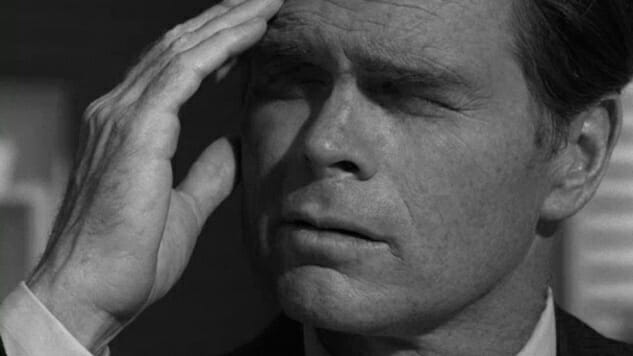
50. “Stopover in a Quiet Town” (Episode 5.30)
The fun of this episode is in viewers arranging the clues to the mystery in their minds until reaching the admittedly silly but humorously mischievous twist. It starts off as a straight thriller, about a couple (Barry Nelson and Nancy Malone) who find themselves in a strange town after a long night of drinking. Just like in “Where is Everybody?” they’re the only people there, and the train, the sole mode of transportation, just keeps riding in a loop. The tone gradually shifts toward farce in Earl Hamner, Jr.’s script, until the ending leaves one in disbelief at having been duped into taking the tongue-in-cheek premise so seriously.
49. “A Passage for Trumpet” (Episode 1.32)
Is an artist’s art a source of inspiration even if the artist can’t make a living, nor find a sliver of the accomplishments they deserve? Serling, who spent many years in poverty and social isolation as he struggled to make it in the entertainment business, could certainly relate to this conflict. That’s what makes his script about a down-on-his-luck trumpeter (Jack Klugman) who attempts to take his own life, only to be saved by an angel who gives him a new perspective on his passion, feels so personal. Klugman had the distinct ability to process so much grief through the simplest of glimpses, so he’s perfectly cast here. The biblical angle at the end is a distraction from the story’s themes, but this is an essential episode for anyone in search of renewed inspiration.
48. “Once Upon a Time” (Episode 3.13)
This one is a godsend for Buster Keaton fans. Serling and the rest of the crew obviously held Keaton’s silent classics in high regard, so they go the extra mile to capture the feel of those films, with a first half that’s entirely silent, complete with intertitles. The story of a man (Keaton) who hates his late-19th century life and finds out that things don’t get that much better in the 20th after he travels in time is as straightforward as it gets, but this one is worth it for Keaton’s performance alone.
47. “The Gift” (Episode 3.32)
The bitter final image of “The Gift” contains an equally bitter truth: People will always be irrationally afraid of those they don’t understand, even if it means they’re acting against their own interests. Serling’s appropriately angry morality tale is about an alien (Geoffrey Horne) who crash-lands on Earth, bringing with him what he claims to be a gift to all people. Predictably, the people demonize the alien, leading to what may be their own doom. A subplot about the alien’s friendship with a boy (Edmund Vargas) shows that not all people are prejudiced, but don’t look for any other moral handholding here.
46. “Miniature” (Episode 4.08)
“Miniature” is the best Season Four episode by a mile, for two reasons. First, it contains one of the most memorable performances of Robert Duvall’s entire career, which is saying a lot. And second, Beaumont’s script focuses entirely on character development instead of the premise, making full use of the one-hour runtime. It’s a tender fantasy/romance about a lonely man (Duvall) who gradually falls in love with a miniature doll (Claire Griswold) that’s part of a miniature house in a department store. Try not to shed a tear upon seeing the beautiful final image.
45. “Nightmare as a Child” (Episode 1.29)
This one is a tightly wound Hitchcockian thriller/murder mystery—so much so that one can imagine the writers of Alfred Hitchcock Presents, still in production when this episode aired, banging their heads on the table and wondering why they didn’t think of it first. In fact, some of the plot points and stylistic choices are so similar to Hitch’s Marnie that one wonders if Hitch himself drew inspiration from the episode. The tense story of a woman (Janice Rule) who’s pestered by a young girl (Terry Burnham) in order to unlock the woman’s suppressed memories leads to a gripping, Rear Window-style climax.
44. “Long Distance Call” (Episode 2.22)
This chilling yet emotionally potent ghost story is a tender examination of a deeply human grievance: our sadness at the thought of leaving this world and never spending time with our loved ones again. But until we get to the ending, William Idelson and Beaumont’s script is chock full of creepy moments: The story focuses on a dead grandmother (Lily Darvas) who communicates with her grandson (Bill Mumy) through a toy phone and tries to convince him to kill himself so they can be in heaven together.
43. “A World of Difference” (Episode 1.23)
One can imagine Andrew Niccol, who wrote The Truman Show, taking notes on this episode about an ordinary businessman (Howard Duff) going about his day, only to hear a director yell “Cut!” It turns out that the man is a character on a TV show, and his consciousness is transferred into the mind of the actor who plays him. Or is he simply losing his mind? Why is he suddenly certain that the world revolves around him? In our post-modern cultural landscape, this existentially edgy and playful episode has aged very well.
42. “The Lateness of the Hour” (Episode 2.08)
The twist in this Rod Serling-penned tale about technophobia presents one of the most psychologically and morally complex examinations of what it would truly mean for artificial intelligence to gain full human sentience. Would they also adopt our worst tendencies, like irrational hatred and prejudice? Inger Stevens stars as Jana, the daughter of a doctor (John Hoyt) who fills his home with robots that tend to his every need. Jana, however, doesn’t trust the robots, fearing they’re stripping her family of its own humanity. Knowing the usual Twilight Zone story structure, it’s not too hard to predict the twist, but that doesn’t make it any less impactful.
41. “The Masks” (Episode 5.25)
Writer Serling takes the moral of children’s tales like Beauty & the Beast—external beauty and inner beauty are unconnected—and applies it to a gloomy horror tale with some nightmare-fuel imagery. A rich man (Robert Keith) on his deathbed has only one condition for his gold-digging heirs if they are to snatch his fortune upon his demise: Each has to wear a creepy mask until the rich man dies. Sounds like an easy compromise, doesn’t it? But keep in mind that this is The Twilight Zone, where the wicked, no matter how pretty they might look on the outside, are always punished in creative ways.
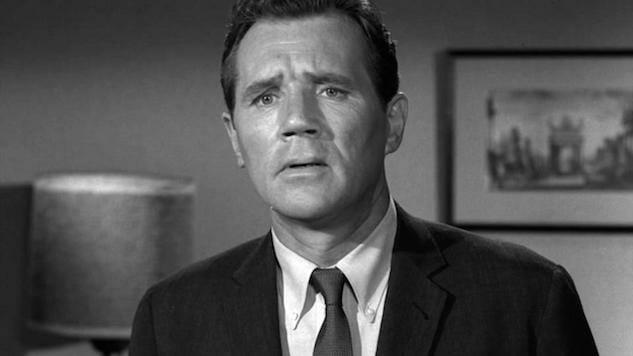
40. “Long Live Walter Jamison” (Episode 1.24)
This Beaumont-penned episode is similar to Serling’s “Escape Clause.” Both stories are about men who are granted immortality, only to realize the banality and loneliness of such an existence. While Serling goes comically high-concept with the idea, Beaumont wisely looks inward. He gently expresses the 2000-year-old protagonist’s (Kevin McCarthy) burdensome life through a dialogue-heavy chamber piece. The episode is also remarkable for its use of groundbreaking make-up techniques. Spielberg might have been taking notes while making Indiana Jones and The Last Crusade.
39. “Deaths-Head Revisited” (Episode 3.09)
The Twilight Zone had a number of biting and angry episodes about the evils of the Third Reich and the Holocaust, and Serling’s fearless insistence on reminding the audience of Nazi atrocities deserves recognition. This is one of his most haunting and frank scripts about the subject. And its story of an ex-Nazi officer (Oscar Beregi) judged by the ghosts of Jews he tortured and killed is directed with appropriate grimness by Don Medford.
38. “The Midnight Sun” (Episode 3.10)
“Midnight Sun” has such a marvelous apocalyptic premise I’m surprised Roland Emmerich hasn’t ripped it off: While Earth faces doom due to the Sun’s close approach, a woman (Lois Nettleton) struggles to get rid of an intruder (Tom Reese) who wants her water, which is in understandably short supply. Rod Serling’s script finds a delicate way of applying such a high-concept idea to the show’s meager budget by turning the story into a tense chamber piece. The ending feels like a cheap cop out at first, but redeems itself with a brilliant twist.
37. “Person or Persons Unknown” (Episode 3.27)
Is identity just a name and a face, or does it go deeper than that? This reverse-Dark City premise follows a man (Richard Long) who wakes up to find that no one knows who he is. He’s of course committed to a psychiatric facility, where he finds some evidence of his existence—evidence that seems to disappear into thin air with each passing minute. An existential nightmare of the highest order, “Person or Persons Unknown” ratchets up the tension early on and never lets go. The climax also does a good job of turning the tables on the protagonist without coming off as cloying.
36. “Steel” (Episode 5.02)
If you’ve been hankering for a better version of the 2011 Hugh Jackman robo-fighting flick Real Steel, here you are: As opposed to that piece of depthless fluff, Matheson’s tight script, about a future boxing league in which only robots are allowed to box, finds a levelheaded examination of the human spirit versus advanced technology. Lee Marvin is excellent as the coach/ex-boxer who’s desperate enough to disguise himself as a robot and step into the ring with a hunk of metal. The result is predictably tragic, with a bittersweet tinge.
35. “The Night of the Meek” (Episode 2.11)
This episode is catnip for fans of heartwarming Christmas tales. A touching story of redemption, “The Night of the Meek” finds a drunken mall Santa (Art Carney) who stumbles on a mysterious bag that can magically produce everyone’s Christmas wishes. It’s full of genuine warmth and Carney’s natural charm and instant affability comes across in his layered performance. In a just world, this episode would be a Christmastime staple.
34. “Will the Real Martian Please Stand Up?” (Episode 2.28)
An Agatha Christie whodunit meets John Carpenter’s The Thing in this stressful but darkly humorous episode. It’s about a bunch of people, stuck in a diner due to extreme weather, who become increasingly suspicious that one of them is an alien. In true whodunit fashion, the episode meticulously builds a sense of paranoia, and though the playful final twist is corny as hell, it nonetheless suits the overall tone.
33. “The Long Morrow” (Episode 5.15)
The Twilight Zone isn’t necessarily known for its romances, but if this one doesn’t tug at your heartstrings, check your pulse. Rod Serling’s tender script is about an astronaut (Robert Lansing) who falls in love with a woman (Mariette Hartley) right before leaving for a decades-long trip he’ll spend in suspended animation. By the time he’s back, he’ll still be young, but his beloved will be much older. The solution that the script finds for this dilemma, which it proceeds to turn on its head many times over, is both practically brilliant and emotionally devastating.
32. “The Big Tall Wish” (Episode 1.27)
It’s possible to get so jaded by life that you close your eyes to the miracles that happen around you, an idea explored by this sweet, inspirational episode about a child named Henry (Steven Perry) who wishes for his favorite boxer (Ivan Dixon) to win a fight. The wish comes true, but the fighter, beaten down by life’s cruelty, refuses to believe in the magic. The ending finds a balance between the real and the fantastical, a tonal mixture that defines what makes The Twilight Zone so special.
31. “The Silence” (Episode 2.25)
This thriller doesn’t feature any fantasy or sci-fi elements, which means it’s more in line with Alfred Hitchcock Presents or Rod Serling’s post-Twilight Zone endeavor, Night Gallery. Still, “The Silence” is an expertly executed short film that challenges the viewer’s expectations every step of the way. A stuffy rich man (Franchot Tone) is annoyed by his loud friend (Liam Sullivan) and offers a bet: If the friend keeps his mouth shut for an entire year, the rich man will give him half a million dollars. The fun in this episode reaches its peak with the sweet irony of the final twist.
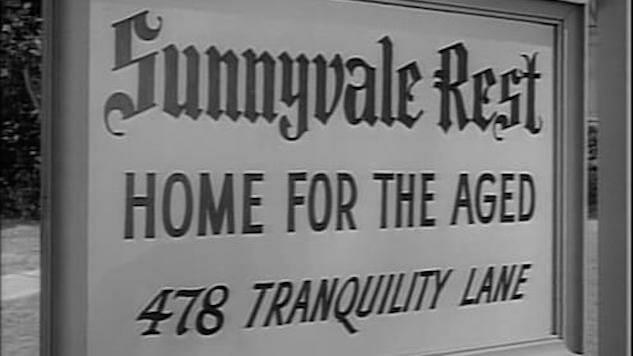
30. “Kick the Can” (Episode 3.21)
With all due respect to Steven Spielberg, his remake of this seminal Twilight Zone episode in the 1983 Twilight Zone movie completely misses the point of Johnson’s script by tacking on an unwise ending. Johnson’s story is about a group of senior citizens whose children leave them to die in a care facility. Pining for the liberating days of their childhoods, the seniors decide to play a game of kick the can. The final image more than deserves the tears it will no doubt bring to your eyes.
29. “Number 12 Looks Just Like You” (Episode 5.17)
People are special because of their imperfections—not their adherence to traditional beauty standards. This socially conscious episode envisions a future in which everyone is surgically altered at age 19 to look like one of the handful of acceptable faces and bodies society deems attractive. Fearing the loss of her identity, a young woman (Collin Wilcox) refuses to participate, becoming a social pariah until the grim but inevitable ending.
28. “To Serve Man” (Episode 3.24)
This may be the most parodied episode of The Twilight Zone: To quote its legendary final lines would be to reveal the deliciously bonkers twist. This tongue-in-cheek alien encounter story finds a group of telepathic E.T.s—led by Richard Kiel, better known as James Bond’s foe, Jaws—greeting humans with a book titled “To Serve Man.” Anyone with a passing knowledge of The Simpsons’ “Treehouse of Horror” episodes should already know where the pulpy but admittedly clever wordplay is going. And whether or not you’re clued into the twist, the self-aware tone of Serling’s script is still a ton of fun.
27. “The Odyssey of Flight 33” (Episode 2.18)
Some great Twilight Zone episodes don’t feature a clear sociocultural theme or complex existential narrative: Some cruise by splendidly on their execution of a fascinating premise. This story of a commercial plane that gets lost in time after flying through a portal is chock full of shocking and sometimes entertainingly goofy twists. Approach this one as a light sci-fi rollercoaster ride and you’ll have a blast.
26. “It’s a Good Life” (Episode 30.8)
Perhaps the TV episode that best explains the chaos of the Trump presidency came out almost six decades ago. Serling’s script, based on a short story by Jerome Bixby, immediately goes from 0 to 60 on the shock meter by starting off with a bunch of adults begging each other to kill a child (Billy Mumy). Yet this is no ordinary kid. Imbued with unlimited magical power, he can make anyone who doesn’t cater to his every whim disappear. This creates a bizarre culture in which adults are forced to trip over one another to get in the child’s good graces. “It’s a Good Life” is a chilling tale of what happens when absolute power is left in the hands of the wrong person. It’s a lesson we still haven’t learned.
25. “Twenty Two” (Episode 2.17)
The streamlined simplicity of this spooky-as-hell horror tale is what turns it into prime nightmare fodder: A dancer (Barbara Nichols) is haunted by a recurring dream in which she ends up at a morgue where a sinister nurse tells her there’s room for one more. The episode constructs its Lynchian logic so effectively that one almost wishes it didn’t have such a traditional ending, but it’s still hard to deny the shock to the senses. Because of budget cuts, a handful of Season Two episodes were shot on videotape, mimicking the aesthetic of the era’s live television dramas. “Twenty Two” is the only one to use the format’s flat, clinical look to its off-kilter advantage.
24. “The Grave” (Episode 3.7)
Is it possible for the fear of death to kill our spirit before death itself takes our body? This borderline Gothic western episode, written and directed by Montgomery Pittman, is a ruthless examination of the destructive power of fear. Lee Marvin is once again great in a Twilight Zone role, this time as a gunslinger haunted by what his latest victim said before he died: If the gunslinger ever visits his grave, he will grab him and pull him down into the dirt with him. In order to prove the silliness of this premonition, the gunslinger decides to visit the grave. But is it enough to pretend we’re over our fears, or will ignoring our feelings seal our doom?
23. “Living Doll” (Episode 5.6)
Decades before the Child’s Play and Annabelle franchises took advantage of the murderous living doll idea, this pulpy yet genuinely terrifying episode perfected the premise. Telly Savalas plays a grumpy dad who becomes increasingly suspicious of his daughter’s talking doll. He’s right to be paranoid since the doll has it out for him, and he better be careful if he wants to live through the night. To this day, it’s hard to think of the line “My name is Talky Tina, and I’m going to kill you” without chills running down my spine.
22. “The Howling Man” (Episode 2.5)
Fans of Edgar Allen Poe-style supernatural horror will more than likely fall in love with this moody and dark tale about faith versus rationality. Beaumont’s tightly wound mystery sees a wanderer (H.M. Wynant) stumbling upon a hermitage where a priest (John Carradine) has imprisoned a man (Robin Hughes) he claims is the Devil. Is the priest a dangerous zealot, or is there truth to his claims? That’s up to the protagonist, a placeholder for humanity’s variable convictions, to figure out: Will he save the life of an innocent person or doom the planet? I almost wish there weren’t an answer at the end, but the clever use of special effects makes it worthwhile.
21. “A Game of Pool” (Episode 3.5)
It’s a delight to watch Jack Klugman and Jonathan Winters, a great actor and a great comedian, share such instant chemistry in this cautionary tale about ambition. Klugman plays an arrogant pool player who wishes to square against Winters’ legendary (but dead) player. He ends up getting his wish, though of course The Twilight Zone thrives on the old, ever-relevant adage, “Be careful what you wish for.” There aren’t many twists or surprises in this chamber piece, and that’s by design. Its staying power rests on the shoulders of its powerhouse performers.
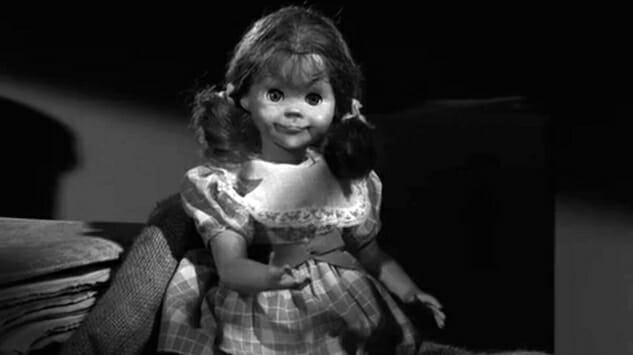
20. “The Trade-Ins” (Episode 3.31)
Those who haven’t had their fill of ugly crying from the ending of “The Long Morrow” are likely to enjoy this unbelievably touching tale of elderly romance. Joseph Schildkraut and Alma Platt are luminous as an aging couple with only enough money to pay for a single operation in which one will be transported into a young body. Which should get a second chance in life, while the other dies of old age? Writer Serling creates a timeless portrait of what it means to spend a lifetime with someone you love.
19. “Two” (Episode 3.01)
Viewers most familiar with the one-note gruffness of Charles Bronson’s Death Wish should check out this episode, which shows how grand and multilayered an actor he was. Bronson plays one of a handful of survivors of an apocalyptic war. Sick of his loneliness, he comes across a woman (Elizabeth Montgomery, in a pre-Bewitched dramatic performance) who happens to be an enemy soldier. Will these two look past the differences emphasized by their now-destroyed societies, or will the bigotry of old take over once more? By having the characters express their emotions without any dialogue, save for a single line, writer/director Montgomery Pittman creates a streamlined condemnation of war, run through with the hope that humanity might rise from its ashes.
18. “Nothing in the Dark” (Episode 3.16)
This classic episode is mainly known for being one of Robert Redford’s first leading roles, but it’s so much more than that. It’s a single-location supernatural drama about an old woman (Gladys Cooper) who’s terrified of dying, suspecting a friendly policeman (Redford) of being the personification of death. Writer Johnson uses this clever premise as the jumping-off point for a deft study of whether death is a peaceful release or a sinister evil. The answer, in The Twilight Zone, is somewhere in between.
17. “The After Hours” (Episode 1.34)
You’ll never look at mannequins the same way after watching “The After Hours,” one of The Twilight Zone’s best episodes about the existential fragility of identity. Writer Serling gradually dials up the tension in this story about a woman (Anne Francis) who keeps getting familiarly off-putting vibes from a secret floor in a department store. The mystery unfolds gracefully, until we’re suddenly thrown into one of the most genuinely terrifying sequences in the series’ annals. For a TV episode from 1959 to show modern horror how to pull off jump scares is impressive indeed.
16. “Little Girl Lost” (Episode 3.26)
Fans of Poltergeist should find much to enjoy in this episode: The premise and its execution were clear inspirations for Steven Spielberg. (The connection makes even more sense considering that Matheson—the writer of Spielberg’s first feature, Duel—penned the episode.) Here, a girl (Tracy Stratford) gets lost inside a spirit realm hidden inside her home, and her parents (Robert Sampson and Sarah Marshall) decide to enter this world in order to find her and bring her out. Thanks to its relentlessly spooky atmosphere, this episode should satisfy any viewers skeptical of Poltergeist’s special-effects spectacle.
15. “Judgment Night” (Episode 1.10)
Karma’s a bitch in The Twilight Zone, a lesson a random German man (Nehemiah Persoff) who finds himself on an English ship with no memory of how he got there eventually learns in “Judgment Night” to his detriment. This is one of the series’ most morally potent tales about the nature of war: Persoff’s bug-eyed fear, permeating through the character’s confusion, keeps the suspense pounding until we reach the shocking finale, filled to the brim with poetic justice.
14. “Mirror Image” (Episode 1.21)
Ever paranoid that there’s a doppelgänger of you out living the same exact life? Then you might want to skip this incredibly tense episode about a woman (Vera Miles) who suspects that an identical copy of her is getting closer and closer to taking over her identity. What can she do to stop this from happening? Is there anything she can do? The entire episode takes place at a random bus stop. It’s not the sexiest of locations, but it shows that with a killer premise, airtight execution, and passionate performances, any setting can become a playground for The Twilight Zone’s best.
13. “The Obsolete Man” (Episode 2.29)
If you have only one episode to cite as an example of The Twilight Zone’s political vein, make it “The Obsolete Man,” a ruthless depiction of authoritarianism and its ultimately futile grip on power. As always, Burgess Meredith is a force to be reckoned with as a librarian who’s deemed obsolete by his fascist rulers. He makes a bet with the chancellor (Fritz Weaver) to prove who’s really the “obsolete man.” Director Elliot Silverstein’s stark use of German expressionist aesthetic perfectly compliments writer Serling’s high theatrics.
12. “An Occurrence at Owl Creek Bridge” (Episode 5.22)
With The Twilight Zone facing budget problems—the series would be cancelled soon thereafter—Serling had an ingenious idea: Instead of producing a new episode, buy the rights to an award-winning short film and air that instead. The gamble pays off beautifully: “An Occurrence at Owl Creek Bridge,” a mostly silent French short that had previously won the short subject award at Cannes, fits like glove within The Twilight Zone’s format and tonal sensibilities. It’s about a Confederate spy (Roger Jacquet) who survives a hanging when his rope snaps and lives through the many horrors of uncompromising nature on the way back to his beloved. In essence, it’s a much shorter The Revenant with a surrealist twist. Who could ask for more?
11. “The Dummy” (Episode 3.33)
Our journey through The Twilight Zone’s many “evil talking doll” installments has led us to this still-effective horror classic. “The Dummy” is basically a ventriloquist dummy version of All About Eve, with a dash of sweet vengeful puppet murder added for good measure. It’s about an evil dummy (George Murdock) planning his revenge after being replaced by a more family-friendly—and actually inanimate—version. Good luck removing the episode’s infamous final image from your nightmares.
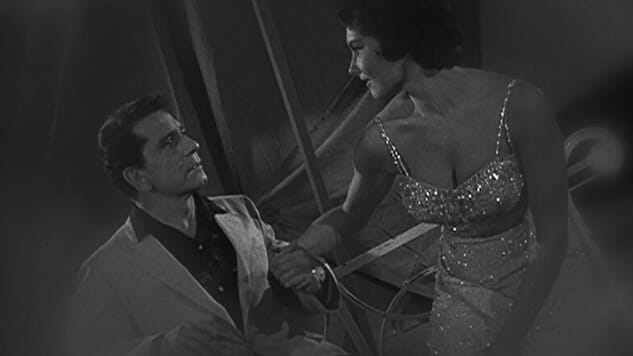
10. “The Lonely” (Episode 1.07)
A heartbreaking romance between an astronaut (Jack Warden) stuck on a desolate planet and the android (Jean Marsh) meant to keep him company. It’s a prime example of Serling’s ability to explore deeply human stories via our connection to technology. Warden and Marsh’s chemistry creates one of the most memorable couples in the entire series. The cinematography fully utilizes empty spaces, accentuating the protagonist’s isolation.
9. “Perchance to Dream” (Episode 1.09)
Beaumont is responsible for writing some of The Twilight Zone’s most chilling horror shorts, and this haunting, cinematically captivating campfire story is his best. Simple but hypnotizing, “Perchance to Dream” centers on an anxiety-ridden man (Richard Conte) telling his therapist (John Larch) that he believes he’ll die when a recurring nightmare finally reaches its end. It never lets go of its meticulously built suspense until the wickedly unforgiving finale.
8. “The Hitch-Hiker” (Episode 1.16)
The twist in this terrific horror short has been replicated so many times in film and TV across the decades that it almost comes across as clichéd now—so much so that just mentioning the titles of movies that have been inspired by it would be giving too much away. What makes it timeless is Alvin Ganzer’s restrained and minimalistic direction, which perfectly compliments Serling’s script. To keep it as vague as possible, I’ll just say it’s about a driver (Inger Stevens) not being able to shake off a mysterious hitchhiker who keeps appearing out of nowhere.
7. “The Invaders” (Episode 2.15)
With “The Invaders,” writer Matheson and director Douglas Hayes create one of the most nail-biting and formidable horror stories in television history. They achieve this with almost no dialogue, a single character, and a single location. The premise is extremely straightforward, yet that’s the key to the episode’s visceral power: A lonely woman (Agnes Moorhead) finds that her home is swarmed by tiny creatures that seem to be trying to kill her, leaving her to fend for her life by any means necessary. The gripping tension, helped tremendously by Moorhead’s performance, would be enough to make it one of the series’ best the show, but the addition of the brilliant final twist perfects it.
6. “Five Characters in Search of an Exit” (Episode 3.14)
This episode is known inspiring Bob Dylan’s “All Along the Watchtower,” but it’s worth watching for so many other reasons, too. Looking at life from various unorthodox perspectives is what makes The Twilight Zone such an interesting vessel for empathy, and nowhere is this more apparent than in the story of five random strangers, all dressed in what appear to be Halloween costumes, not remembering who they are and how they ended up trapped inside an oval, brightly-lit cell. Writer Serling gins up the mystery with some clever elements that get in the way of the characters’ escape plan, and the ending will make you wonder about the meaning of being alive.
5. “Nightmare at 20,000 Feet” (Episode 5.03)
Yes, this is the infamous “gremlin” episode, with William Shatner’s flight-phobic character battling the creepy, furry creature that’s trying to destroy the very plane he’s on. But it isn’t one of The Twilight Zone’s best episodes simply because of its pop-culture pedigree. A young Richard Donner’s airtight direction and an appropriately manic performance by Shatner beautifully compliment Matheson’s script, gradually raising the tension until we reach the boiling point. The George Miller-directed remake for the 1983 movie upgrades the creature with better effects, but there’s something viscerally haunting about the obvious “dude-in-a-furry-suit” creature from the original.
4. “Shadow Play” (Episode 2.26)
The Twilight Zone is full of episodes that depict situations following a nightmare logic. But none are as effective at creating anxiety as “Shadow Play.” Dennis Weaver gives a 110% as a death row inmate convinced that he’s living in an ever-looping dream, and that everyone around him will cease to exist once he’s executed. The nightmare keeps getting closer to the execution, leading even those around Weaver’s character to doubt their own grasp on reality. It’s very hard to pull off a great horror script like this. It’s also tough to write a tense story with existential themes that don’t come across as preachy. To achieve both in the same material produces a kind of magic.
3. “Time Enough at Last” (Episode 1.08)
Twilight Zone MVP Burgess Meredith creates one of the most memorable characters of his legendary career as a meek bookworm who just wants time to read in an increasingly anti-intellectual society. He gets his wish—and things go south from there. It’s hard to think of the line “There was time now” and not get misty-eyed at the tragedy of its brilliant twist and simultaneously crack a mischievous smile at Serling’s cruelly playful sense of humor. Sure, everyone knows the twist by now, but that doesn’t take away from the power of this raw, profoundly human tragicomedy.
2. “The Monsters Are Due on Maple Street” (Episode 1.22)
“The Monsters are Due on Maple Street” is not only one of the finest Twilight Zone episodes; it’s also one of the most vital allegories against fear mongering and xenophobia in short-story form, period. Serling takes a general principle—how human fear and paranoia can turn neighbor against neighbor in increasingly violent ways—and brilliantly distills that into a story about the ordinary residents of an all-American suburban block who become increasingly threatened by each other under the threat of an invasion by aliens disguised as humans. The sardonic but thematically spot-on twist is one of the most poignant moments of the entire series.
1. “The Eye of the Beholder” (Episode 2.06)
“The Eye of the Beholder” is not only the best Twilight Zone episode. It’s one of the greatest short films ever made. Director Douglas Heyes takes Serling’s technically complex but thematically vital and emotionally explosive script and rises to the challenge with grace and cinematic prowess. “The Eye of the Beholder” tells the story of a woman (Maxine Stuart) who’s so ugly that she doesn’t have a chance at a normal life unless she goes through a series of experimental surgeries. The episode had to be shot in a way that didn’t draw attention to even the simplest visual aspects of the characters, at the risk of prematurely giving the explosive twist away. Heyes pulls off this tightrope act off by diverting from technical attention to detail and putting great emphasis on the writing and performances. “The Eye of the Beholder” is peak Twilight Zone: Tense, mysterious, and entertaining from the first frame to the last, while delivering its message in a way that’s fresh, thoughtful, and ultimately timeless.
Oktay Ege Kozak is a film critic and a screenplay coach. He lives near Portland, Ore., with his wife, daughter, and two King Charles Spaniels, while he’s not visiting the dark and mysterious confines of The Twilight Zone.
For all the latest TV news, reviews, lists and features, follow @Paste_TV.
GET PASTE RIGHT IN YOUR INBOX
The best music, movies, TV, books, comedy and more.
-

-

-

-

-

-

-

-

-

-

-

-

-

-

-

-

-

-

-

-

-

-

-

-

-

-

-

-

-

-

-

-

-

-

-

-

-

-

-

-








































